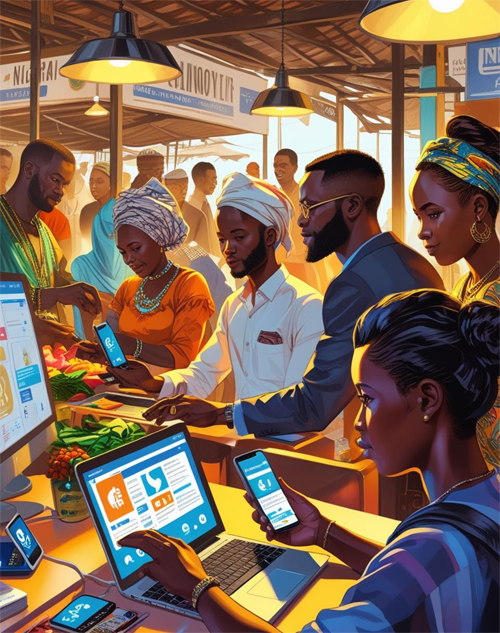Political awareness in the digital era: How social media drives community engagement for development in Nigeria
 Abstract views: 925
,
Abstract views: 925
,
 PDF downloads: 458
PDF downloads: 458
Abstract
This study was conducted to examine social media, herein referred to as SM-driven community engagement, and its role in political awareness creation towards socio-political development in Nigeria. The rationale behind the study was the need for insights as to the place of SM engagement in political awareness creation. The researcher relied on a survey research design using a multistage sampling technique to determine the final population sample for the survey. A Google Forms-aided questionnaire was designed, and a link was shared with the respondents. The findings of the study show greater access to SM platforms among Nigerians, with political information as one of the most prominent contents. SM-disseminated political information creates awareness as youth with greater access become interested in political matters on account of their exposure to such information across platforms. Furthermore, the study also shows that community engagement is enhanced by virtue of the use of SM for political awareness creation. It was also revealed that the capacity of SM as platforms for awareness creation drives community engagement and development in Nigeria. This is particularly the case with respect to the development of political consciousness towards meaningful participation in the political sphere. The researcher concluded that SM-driven political awareness creation creates informed citizens capable of making decisions from an informed perspective toward the development of society in the current digital era.
Downloads
References
Adams, E. J., Ofordi, J., Abdulmumini, A., & Isah, J. M. (2024). The role of social media play in generating political awareness, discussion and strategies for better elections. Archive of Social Sciences and Humanities, 3(1), 9-37. https://passhlondyn.eu/wp-content/uploads/2024/02/Download-the-PDF.pdf.
Aduko, F. P. (2021). Social media and hate speech: Implications for socio-political stability in Rivers State. Global Journal of Human Social Sciences, 21(2), 27–51. https://gjhss.com/index.php/gjhss/article/view/1433.
Agbim, K. C., Etumnu, E. W., & Iredibia, K. U. (2023). The Obidient movement on Twitter and 2023 general election in Nigeria: An extrapolative analysis. IMSU Journal of Communication Studies, 7(1), 347-358.
Ahmed, S. T. (2024). Importance of political awareness. Islamic Voice. https://islamicvoice.com/reflections/importance-of-political-awareness.
Aina, O. B., & Afolaranmi, A. O. (2025). Impact of social media on political opinion before and during Nigeria’s 2023 election. Innovative Research Journal of Sociology and Humanities, 2(1), 1-7. https://doi.org/10.58806irjsh.2025.v2i1n01
Ali, A., Sohail, S., & Hassan, S. A. (2013). Political awareness and media’s consumption patterns among students – A case study of University of Gujrat, Pakistan. Journal of Culture, Society and Development, 2, 29-34. https://www.iiste.org/Journals/index.php/JCSD/article/view/9171/9390.
Alodat, A. M., Al-Qora’n, L. F., & Hamoud, M. A. (2023). Social media platforms and political participation: A study of Jordanian youth engagement. Social Sciences, 12, 402. https://doi.org/10.3390/socsci12070402
Benaiah, W. O., & Osuntoki, D. (2024). The impact of social media on political mobilisation in Nigeria: A case study of the Obidient movement. American Journal of Arts and Human Science, 3(3), 228-238. https://doi.org/10.54536/ajahs.v3i3.3336
Chiamogu, A. P., Obikeze, O. S. A., Chiamogu, U. P., & Odikpo, E. (2021). Social media and group consciousness in Nigeria: Appraising the prevalence of socio-political protests. Open Journal of Political Science, 11(4), 682–696. https://doi.org/10.4236/ojps.2021.114043
Duru, C. W. (2023). Social media as an emerging tool for political participation in Nigeria: A study of Facebook. International Journal of Library and Information Technology, 4(1), 203–213. https://gojamss.net/journal/index.php/IJLIT/article/view/986.
Erubami, A, J. (2020). Public perception of social media contributions in political participation processes in Delta State, Nigeria. Communicatio, 14(1), 108-124. https://dj.univ-danubius.ro/index.php/AUDC/article/view/400.
Ezeigbo, M. E. (2024). Social media and youths participation in 2023 general elections in Nigeria. International Journal of Public Administration, 3(2), 221-232. https://ijopad.org.ng/wp-content/uploads/2024/09/IJOPAD-VOL-32-16.pdf.
Fakeye, O. (2023). Impact of social media on political awareness: A case study of Ilaro Youths. International Journal of Women in Technical Education and Employment, 4(1), 85–92. https://fpiwitedjournal.federalpolyilaro.edu.ng/administrator/docs/6308447.pdf.
Glazier, R. A., & Topping, M. P. (2021). Using social media to advance community-based research. Political Science and Politics, 54(2), 254–258. https://doi.org/10.1017/s1049096520001705
Hendricks, A. (2023). Community engagement: Definitions, benefits and examples. Simply Stake. https://simplystakeholders.com/what-is-community-engagement.
Husain, H., & Sani, M. K. J. A. (2022). Social media as therapy for community development. Conference Proceedings of the International Seminar on Counseling and Psychology at Amman Jordan. https://www.researchgate.net/publication/360600781
Idris, J., & Fagbenro, A. (2019). Lagos the mega-city: A report on how the metropolis handled an outbreak of the Ebola epidemic. Socio-cultural Dimensions of Emerging Infectious Diseases in Africa, 281-298. https://doi.org/10.1007/978-3-030-17474
Inobemhe, K., & Asemah, E. S. (2025). Social media and mobilisation of voters during elections in Nigeria. In E. S. Asemah (ed.), Reputation management and strategic communication in a digital age (pp. 91-103). Enugu: Franklead Printing and Publishing Company.
Inobemhe, K., Gana. S. V., & Garba, S. (2025b). Investigating the users’ perception of social media amplification of political crisis and power tussle discourse in Nigeria. International Journal of Advances in Social Sciences and Humanities, 4(1), 49–63. https://doi.org/10.56225/ijassh.v4i1.399
Inobemhe, K., Ja’afaru, S. G., Santas, T., Obiechina, C. K., & Okpodu, O. M. (2025a). A discursive reassessment of the world information and communication order: Social media bridged the gap. The Journal of Society and Media, 9(1), 49–73. https://doi.org/10.26740/jms.v9n1.p49-73
Inobemhe, K., Santas, T., & Isah, A (2022). Implications of social media fake news for national security during COVID-19 pandemic in Nigeria. In E. S. Asemah, D. O. Ekhareafo & T. Santas (eds.), Discourses on communication and media studies in contemporary society (pp. 340-349). Jos University Press. https://www.researchgate.net/publication/358923057.
Inobemhe, K., Ugber, F., Ojo, I. L., & Santas, T. (2020). New media and the proliferation of fake news in Nigeria. Nasarawa Journal of Multimedia and Communication Studies, 2(2), 154-168. https://www.researchgate.net/publication/352863583.
Intyaswati, D., Maryani, E., Sugiana, D., & Venus, A. (2021). Social media as an information source of political learning in online education. SAGE Open, 11(2). https://doi.org/10.1177/21582440211023181
Kemp, S. (2024). Digital 2024: Nigeria. Data Reportal. https://datareportal.com/reports/digital-2024-nigeria.
Krejcie, R. V., & Morgan, D. W. (1970). Determining sample size for research activities. Educational and Psychological Measurement, 30(3), 607-610. https://doi.org/10.1177/001316447003000308
Kristensen, N. N. (2022). Political awareness and identification among young students: Political identity and democratic engagement. In N. N. Kristensen, T. Denk, M. Olson & T Solhaug (eds.), Perspectives on political awareness (pp. 57-77). Springer, Cham. https:/doi.org/10.1007/978-3-030-9039
Lakshmi, T. V., & Prasad, T. S. P. L. N. (2024). Leveraging social media platforms for community engagement and information dissemination. In G. Rathinasabapathy, S. R. Lihitkar, U. S. Jadhav, G. Balakrishna & D. Chatterjee (eds.), Global trends and emerging technologies in libraries and information science (A festschrift in honour of Dr. K. Veeranjaneyulu). Sultan Bazar: BS Publications. https://www.researchgate.net/publication/38110723.
Michael, C. (2024, March 18). Number of Nigerians on social media hits 36.7 million – Report. Business Day. https://businessday.ng/technology/article/number-of-nigerians-on-social-media-hits-36-7-million-report.
Mishnick, N., & Wise, D. (2024). Social media engagement: An analysis of the impact of social media campaigns on Facebook, Instagram and LinkedIn. International Journal of Technology in Education, 7(3), 535–549. https://doi.org/10.46328/ijte.699
Mohammed, M. Y., & Kirfi, M. M. (2024). The role of social media in political mobilisation: A study of APC gubernatorial election in Gombe State. Kashere Journal of Politics and International Relations, 2(1), 320–331. https://journals.fukashere.edu.ng/index.php/kjpir/article/view/247m.
Morah, D. N., & Nwafor, O. A. (2024). Beyond tribal politics for e-participation and development: Social media influence on Nigeria’s 2023 presidential general election. Journal of Innovative Digital Transformation, 1(1), 32–47. https://doi.org/10.1108/JIDT-08-2023-0004
Muhammad, A., & Abdullahi, A. (2020). Social media and youth awareness on civic governance and public accountability in Zamfara State. Zamfara Journal of Politics and Development, 1(1), 1-15. https://zjpd.com.ng/index.php/zjpd/article/view/1.
Muhammad, M., Shabbir, T., & Moroojo, M. Y. (2023). Role of electronic media in political awareness among the people of Nawabshah. Journal of Media and Communication, 4(2), 121–138. https://ojs.ilmauniversity.edu.pk/index.php/jmc/article/view/34/22.
Okoli, A. C., & Agantiem, A. (2023). Language, electioneering, and social media contestations in Nigeria: The ‘Obidients’ and their opponents. Central European Journal of Politics, 9(2), 1-12. https://doi.org/10.21062/cejp.2023.003
Ologunebi, J., & Taiwo, E. (2025). The impact of digital communication on governance, political dynamics, and leadership; A case study of the Nigerian people and process. MPRA Paper No. 123310. https://mpra.ub.uni-muenchen.de/123310.
Oluwatosi, O., Olusoji, O. S., Olusola, A., & Olugbenga, P. A. (2020). The influence of media on political knowledge amongst undergraduate students in Ibadan, Nigeria. Global Journal of Social Sciences, 19, 13-24. https://doi.org/10.4314/gjss.v19i1.2
Oparaugo, C. (2021). Social media and politics in Nigeria: A conceptual framework. International Journal of Research and Scholarly Communication, 4(1), 7–19. https://royalliteglobal.com/ijoras/article/view/510.
Rahman, S., & Razali, C. H. C. M. (2018). Political awareness among students. Gading (Online) Journal for Social Sciences, 22, 130-133. https://ir.uitm.edu.my/id/eprint/29447/1/29447.pdf.
Salmons, J. (2023). Designing survey research. Sage Research Methods Community. https://researchmethodscommunity.sagepub.com/blog/designing-survey-research.
Sebastin, O. (2024). Impact of social media on political awareness of students of education political science in public universities in Enugu State, Nigeria. Journal of Political Science and Leadership Research, 10(4), 25–32. https://doi.org/10.56201/jpslr.v10.no4.2024.pg25.32
Siyal. N. A., & Brohi, A. M. (2022). Social media and political awareness. Benazir Research Journal of Humanities and Social Sciences, 2(1), 64–82. https://www.researchgate.net/publication/379310019.
Solhaug, T., Denk, T., Olson, N., & Kristensen, N. N. (2018). Political awareness, concept and measurement. Paper presented at ECPR General Conference Hamburg Germany. https://ecpr.eu/Events/Event/PaperDetails/41662.
Suemo, J., Ahmad, M. B., & Mohammed, A. (2024). An analysis of the major factors of hate speech in the Nigerian digital environment. Journal of Communication and Media Research, 16(1), 32–46. https://www.jcmrjournal.org/article/an-analysis-of-the-major-factors-of-hate-speech-in-the-nigerian-digital-environm_585.
Tan, J. J. (2023). Social media political information use and political participation of the net generation. e-Bangi: Journal of Social Sciences and Humanities, 21(1), 189–211. https://doi.org/10.17576/ebangi.2024.2101.17
Tan, J. J., Firdaus, A., & Aksar, I. A. (2024). Social media for political information: A systematic literature review. Jurnal Komunikasi: Malaysian Journal of Communication, 40(1), 77-98. https://doi.org/10.17476/JKMJC-2024-4001-05
Umogun, M. (2023, Apr. 10). Social media and Nigeria’s nascent democracy. Business Day. https://businessday.ng/news/article/social-media-and-nigerias-nascent-democracy.

Copyright (c) 2025 PERDIKAN (Journal of Community Engagement)

This work is licensed under a Creative Commons Attribution-NonCommercial 4.0 International License.
In order for PERDIKAN to publish and disseminate research articles, we need publishing rights. This is determined by a publishing agreement between the author and PERDIKAN. This agreement deals with the transfer or license of the copyright to PERDIKAN and authors retain significant rights to use and share their own published articles. For both subscription and open access articles, published in proprietary titles, PERDIKAN is granted the following rights:
- The right to provide the article in all forms and media so the article can be used on the latest technology even after publication.
- The authority to enforce the rights in the article, on behalf of an author, against third parties, for example in the case of plagiarism or copyright infringement.
Copyright aims to protect the specific way the article has been written to describe an experiment and the results. PERDIKAN is committed to its authors to protect and defend their work and their reputation and takes allegations of infringement, plagiarism, ethic disputes and fraud very seriously.
If an author becomes aware of a possible plagiarism, fraud or infringement we recommend contacting their PERDIKAN publishing contact who can then liaise with our in-house legal department. Note that certain open access user licenses may permit


1.png)


1.png)


